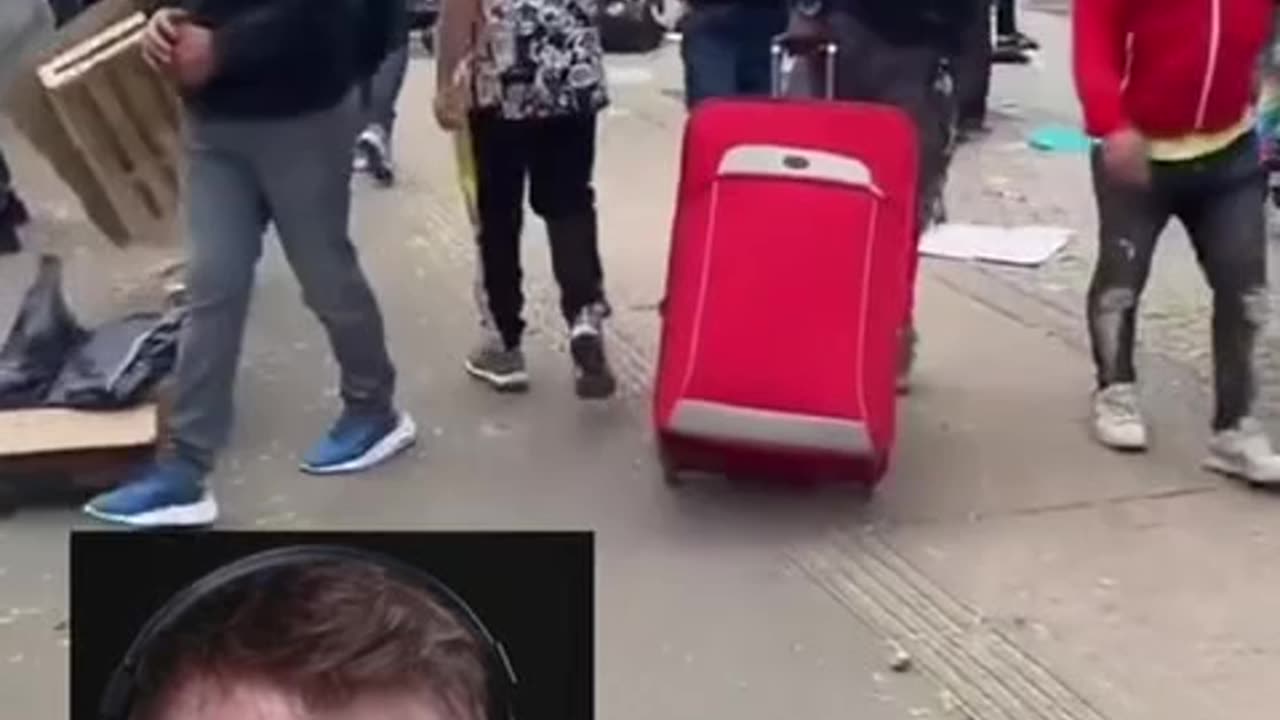Premium Only Content

The Changing Face of Paris: Reflecting on the Impact of Immigration on the City’s Identity
Paris, once celebrated as the “City of Light,” a beacon of culture, art, and sophistication, has increasingly become the focal point of deep societal challenges. In recent years, this once-renowned metropolis has faced a rapid transformation, with many Parisians feeling that their city’s identity is slipping away. The impact of illegal immigration, exacerbated by social and economic factors, is reshaping the cityscape and sparking debates about the essence of French society and the challenges of integration.
A City of Contrasts: The Paris of Today
Many visitors, and indeed residents, are taken aback by the Paris they encounter today. The city center, previously an icon of European culture, now shows signs of strain under the weight of an influx of migrants. Tents and makeshift shelters line city streets, and many historic sites are now interwoven with visible signs of poverty and overcrowding. From abandoned lots on the outskirts to popular public spaces, these contrasts in the Parisian landscape reveal a side of the city grappling with severe urban and humanitarian challenges.
One cannot ignore the underlying factors that led to this situation. Globalization, economic instability, and displacement due to conflict and poverty have fueled waves of immigration. France’s geographical position, as well as its colonial history, makes it a common destination for migrants from Africa, the Middle East, and other regions seeking refuge or better economic prospects.
Strain on Infrastructure and Social Services
The humanitarian crisis that results from unregulated immigration creates tangible strain on Paris’s infrastructure. Hospitals, schools, and public services have seen an increased demand, often exceeding capacity. Housing shortages, particularly in cities like Paris, mean that many migrants have few options beyond street encampments or temporary shelters. This, in turn, leads to rising concerns over hygiene, public health, and safety.
Paris’s public services, already struggling under economic constraints, face the added responsibility of addressing the needs of a growing population. Health services are stretched thin, schools are faced with larger and increasingly diverse classrooms, and public transportation systems experience congestion, particularly in areas where immigrants have concentrated. These strains raise questions about the extent to which the city can effectively support an expanding population without significant policy shifts or increased resources.
Cultural Identity and Integration Challenges
France has long embraced ideals of “liberté, égalité, fraternité”—liberty, equality, fraternity. Yet, integrating a large, diverse population into a society with deeply rooted cultural traditions has proved challenging. For centuries, France’s identity was shaped by secularism, the arts, and a distinct cultural heritage. However, the rapid pace of demographic change in recent years has raised questions among native Parisians about how immigration is affecting France’s traditional values.
While many immigrants have assimilated and contributed to French society, others have faced obstacles to integration, often stemming from cultural and linguistic differences. The struggle to balance assimilation with cultural preservation has created a sense of alienation, not only for immigrants but also for native Parisians who feel that the social fabric they once knew is being reshaped at a pace they cannot influence or fully understand.
Economic Complexities: The Benefits and the Burden
Economically, immigration brings a mixture of benefits and burdens. Migrants often fill labor gaps in low-paying, essential jobs within sectors like construction, sanitation, and food services. However, high unemployment rates among immigrants and their descendants, combined with social services costs, can place additional stress on public finances. It’s a complex economic equation—while immigrants contribute to the workforce, the pressure on social systems, particularly in densely populated areas, is undeniable.
The city’s informal economy, driven in part by undocumented immigrants, creates another layer of complexity. Informal employment can sustain families, but it also destabilizes the broader economy by creating precarious working conditions and circumventing labor protections, which impacts the welfare of immigrants and residents alike.
Navigating the Path Forward: Policy and Community Solutions
Paris stands at a critical juncture. Addressing these challenges will require balanced and forward-thinking policies. Improved immigration management, clearer pathways to legal employment, and investment in public infrastructure could help alleviate the pressure. Social programs that emphasize education, job training, and language acquisition for immigrants may also support better integration outcomes.
Policymakers face the difficult task of balancing compassion and pragmatism. Restricting immigration is a common reaction, but without addressing underlying economic and geopolitical drivers, such measures may only offer temporary relief. Sustainable solutions may require a blend of local and global efforts, such as investing in economic stability and peace-building initiatives in source countries to reduce the forces driving mass migration.
Conclusion: Preserving the Heart of Paris
Paris is more than a city; it is a symbol of history, culture, and resilience. The challenges the city faces are not without precedent, but the scale and rapidity of recent transformations have brought about unprecedented social tension. For many, Paris remains a sanctuary, a beacon of hope in times of strife, while for others, it is becoming a place where their heritage feels at risk.
A way forward lies in dialogue and unity, in acknowledging both the value that diversity brings and the need to preserve the distinct culture that has defined Paris for centuries. The future of the city will depend on the choices made by its people and leaders in the coming years—choices that must navigate the complex terrain of compassion, pragmatism, and identity. Whether Paris can retain its character while embracing the changing world around it is a question that will define not only the city but also the resilience of French society as a whole.
-
 LIVE
LIVE
Danny Haiphong
1 hour agoMARK SLEBODA & SCOTT RITTER: NATO ATTACKS RUSSIA, PUTIN FIRES ICBM WARNING SHOT AT UKRAINE—WW3 NEXT?
869 watching -
 40:47
40:47
Dave Portnoy
4 hours agoThe Unnamed Show With Dave Portnoy, Kirk Minihane, Ryan Whitney - Episode 37
10.7K1 -
 51:53
51:53
The Rubin Report
2 hours agoCrowd Shocked by Ben Affleck’s Unexpected Take on This Massive Change
24.7K32 -
 2:07:25
2:07:25
Steven Crowder
4 hours agoBREAKING: Russia Launches ICBM for First Time in History - What Happens Next?
297K176 -
 LIVE
LIVE
The Shannon Joy Show
5 hours ago🔥🔥While Americans Are Watching WWE Politics: Australia Is Ramping Up MANDATORY Digital ID🔥🔥
560 watching -
 2:03:36
2:03:36
LFA TV
15 hours agoTHE FIGHT IN ONLY BEGINNING! | LIVE FROM AMERICA 11.21.24 11am EST
21.4K15 -
 1:18:10
1:18:10
Graham Allen
5 hours agoPutin Vows Peace With Trump But WAR Under Biden!! + 400,000 Kids Are MISSING?!
97.6K202 -
 2:11:07
2:11:07
Matt Kohrs
13 hours agoMSTR Squeezes Higher, Bitcoin To $100k & Nvidia Post Earnings || The MK Show
47.6K1 -
 42:07
42:07
BonginoReport
7 hours agoNikki Haley's Hatred of Tulsi Gabbard Just Made Me a Bigger Fan (Ep.90) - 11/21/24
98.5K215 -
 28:41
28:41
Professor Nez
12 hours ago🚨BLOOD on their HANDS! The Man Biden & Kamala Flew In Finally Faces JUSTICE for Laken Riley
50.7K30